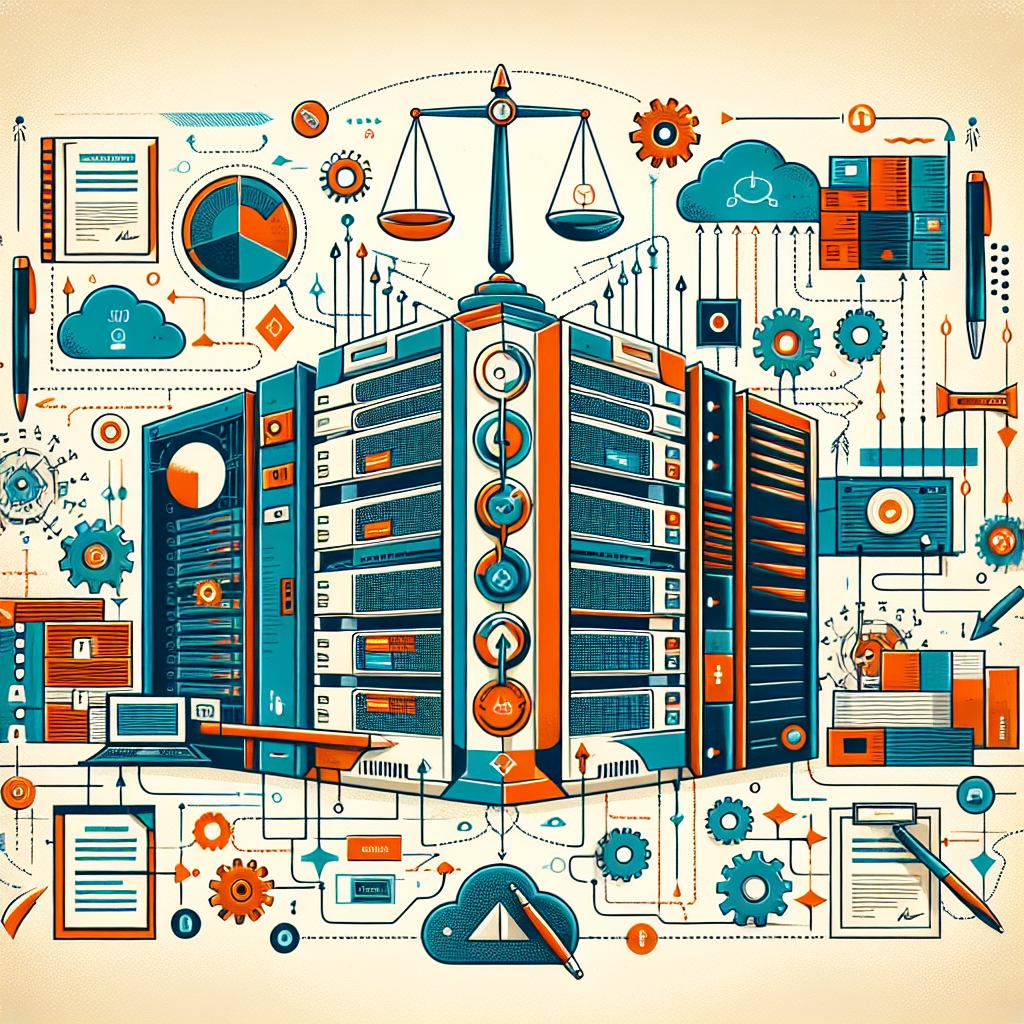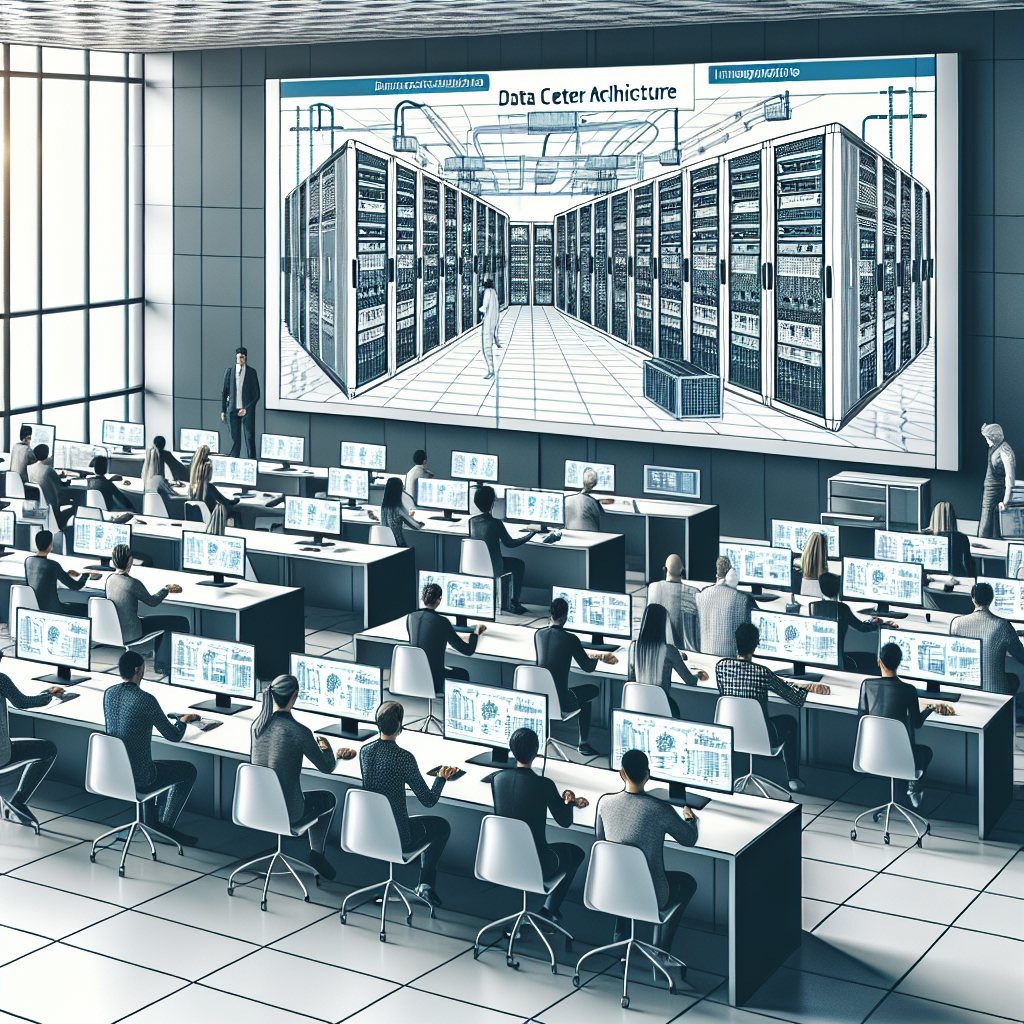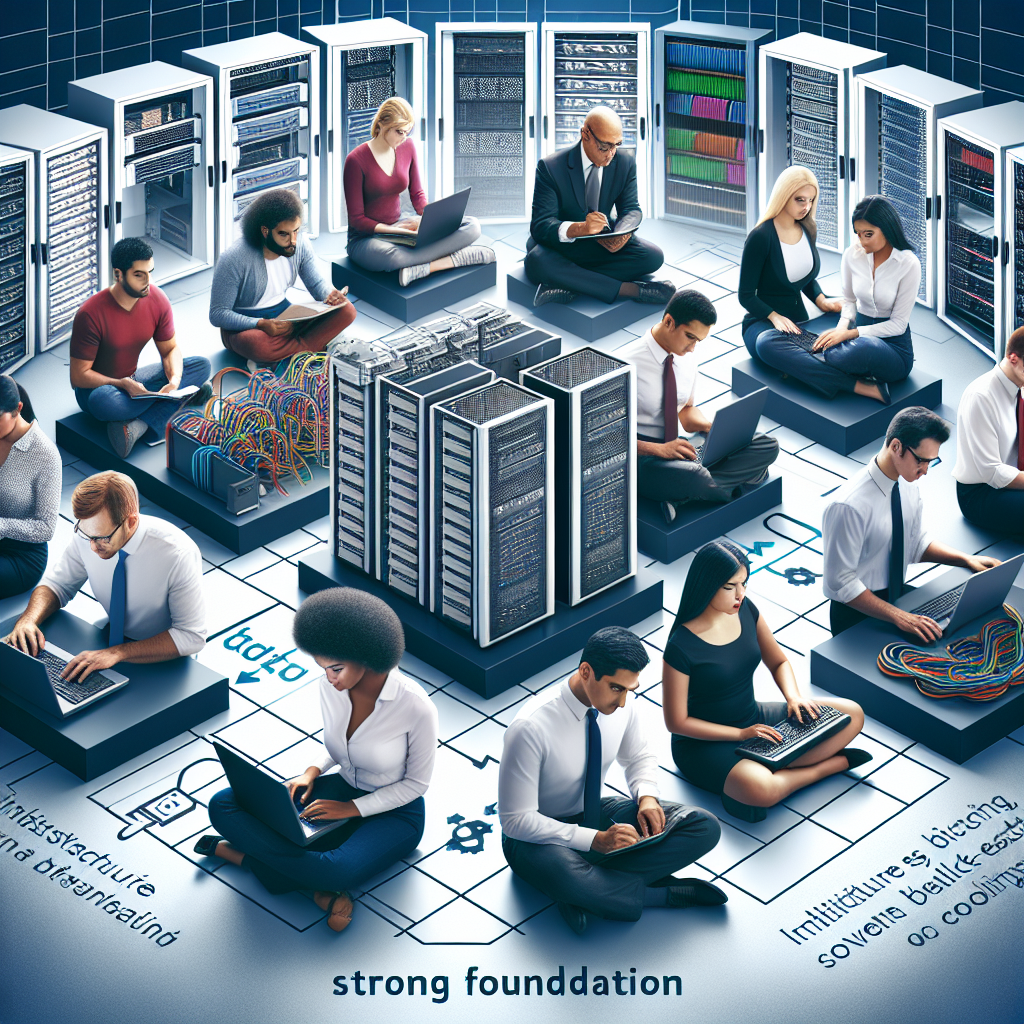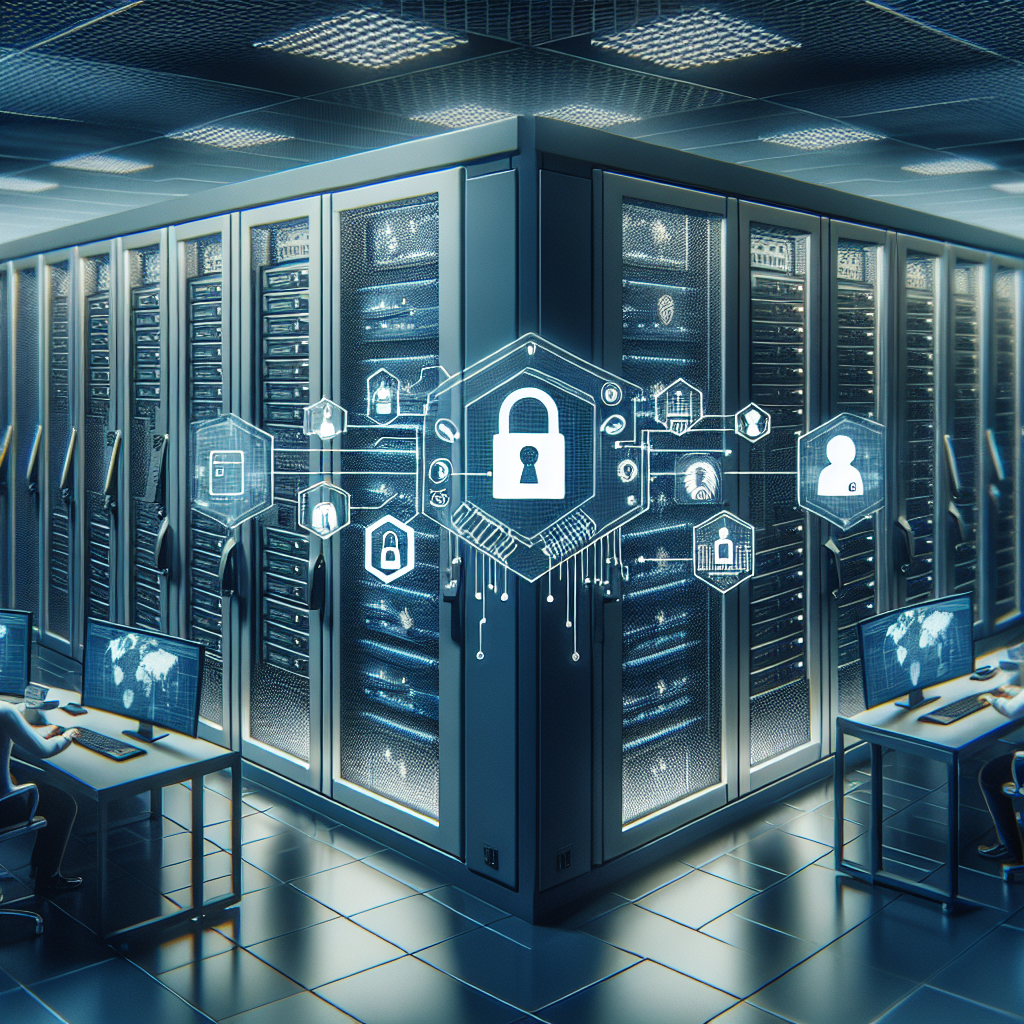Your cart is currently empty!
Tag: Strong

Building a Strong Foundation: Key Skills and Certifications for Data Center Training
Data centers are a critical component of modern businesses, serving as the backbone of their IT infrastructure. As the demand for data center services continues to grow, there is a need for skilled professionals who can design, build, and maintain these facilities. Building a strong foundation in data center training is essential for anyone looking to pursue a career in this field.Key Skills for Data Center Training
There are several key skills that are essential for individuals looking to excel in data center training. These include:
1. Technical Knowledge: It is essential to have a strong understanding of IT infrastructure, including networking, storage, and server technologies. This knowledge will help you design and maintain data center environments that are efficient and reliable.
2. Problem-solving Skills: Data centers are complex environments that require quick thinking and problem-solving abilities. Being able to troubleshoot issues and find solutions quickly is a critical skill for anyone working in this field.
3. Attention to Detail: Data centers require a high level of precision and attention to detail. From cabling and rack configurations to power distribution and cooling systems, every detail must be carefully planned and executed.
4. Communication Skills: Data center professionals often work in teams and collaborate with other departments within an organization. Strong communication skills are essential for effectively conveying information and coordinating efforts to ensure the smooth operation of the data center.
Certifications for Data Center Training
In addition to developing key skills, obtaining relevant certifications can also help individuals build a strong foundation in data center training. Some of the most reputable certifications in this field include:
1. Certified Data Center Professional (CDCP): This certification covers the fundamentals of data center design, construction, and operations. It is a valuable credential for individuals looking to enter the data center industry.
2. Certified Data Center Specialist (CDCS): This certification is designed for individuals who already have some experience in data center operations. It covers advanced topics such as data center management, disaster recovery, and business continuity.
3. Cisco Certified Network Associate (CCNA): This certification is widely recognized in the IT industry and covers networking fundamentals that are essential for data center professionals.
4. VMware Certified Professional (VCP): This certification focuses on virtualization technologies, which are commonly used in data center environments to optimize resources and improve efficiency.
By acquiring these certifications and developing key skills, individuals can build a strong foundation in data center training and position themselves for a successful career in this rapidly growing field. With the increasing demand for skilled data center professionals, now is the perfect time to invest in training and certification to advance your career in this exciting industry.

Key Components of a Strong Data Center Service Level Agreement
In today’s digital age, data centers play a crucial role in ensuring the smooth functioning of businesses and organizations. A data center is a facility that houses computer systems and associated components, such as storage and networking systems. To ensure that data centers operate efficiently and meet the needs of their clients, it is essential to have a strong Service Level Agreement (SLA) in place.A Service Level Agreement is a contract between a service provider, in this case, a data center, and a customer that outlines the level of service that will be provided. A strong SLA is vital for both parties as it establishes expectations, responsibilities, and accountability. When it comes to data centers, there are several key components that should be included in a strong SLA:
1. Uptime Guarantee: One of the most critical components of a data center SLA is the uptime guarantee. This refers to the amount of time that the data center’s services will be available to the customer. A strong SLA should clearly outline the level of uptime that is guaranteed, such as 99.9% uptime or higher.
2. Performance Metrics: Another key component of a data center SLA is the inclusion of performance metrics. These metrics can include things like network latency, data transfer speeds, and response times. By including specific performance metrics in the SLA, both parties can track and monitor the data center’s performance.
3. Security Measures: Data security is of utmost importance in data centers, as they house sensitive information and valuable data. A strong SLA should outline the security measures that the data center has in place to protect the customer’s data, such as encryption protocols, access controls, and security audits.
4. Disaster Recovery Plan: In the event of a natural disaster or system failure, a data center must have a robust disaster recovery plan in place. A strong SLA should outline the steps that the data center will take to recover data and resume operations in the event of a disaster.
5. Customer Support: Customer support is another critical component of a data center SLA. The SLA should detail the level of customer support that will be provided, such as 24/7 technical support, response times for issue resolution, and escalation procedures.
In conclusion, a strong data center SLA is essential for ensuring the smooth functioning of a data center and meeting the needs of its clients. By including key components such as uptime guarantees, performance metrics, security measures, disaster recovery plans, and customer support, both parties can establish clear expectations and responsibilities. A well-crafted SLA can help to build trust and accountability between the data center and its clients, ultimately leading to a successful partnership.

Data Center Training: Building a Strong Foundation for Success
In today’s digital age, data centers play a crucial role in the operation of businesses and organizations. These facilities house the servers, storage devices, networking equipment, and other components that store and process data. With the increasing reliance on technology, the demand for skilled professionals to manage and maintain data centers is on the rise.Data center training is essential for individuals looking to build a successful career in this field. By acquiring the necessary skills and knowledge, aspiring data center professionals can build a strong foundation for success. Here are some key reasons why data center training is important:
1. Understanding of data center technologies: Data center training provides individuals with a comprehensive understanding of the technologies and systems used in data centers. This includes knowledge of servers, storage devices, networking equipment, virtualization, cloud computing, and cybersecurity. By gaining this knowledge, data center professionals can effectively manage and troubleshoot issues within the facility.
2. Hands-on experience: Data center training often includes hands-on exercises and practical labs that allow individuals to apply their knowledge in real-world scenarios. This hands-on experience is invaluable for gaining practical skills and confidence in managing data center operations.
3. Industry certifications: Many data center training programs offer industry certifications that validate the skills and knowledge of professionals in this field. These certifications, such as CompTIA Server+ or Cisco Certified Network Associate (CCNA) Data Center, are recognized by employers and can enhance job prospects and earning potential.
4. Career advancement opportunities: With the rapid growth of data center technology, there is a high demand for skilled professionals in this field. Data center training can open up new career opportunities and pave the way for advancement within an organization. By acquiring specialized skills and certifications, individuals can position themselves for roles such as data center manager, network administrator, or cloud architect.
5. Continued learning and professional development: Data center training is not a one-time event but rather an ongoing process of learning and professional development. As technology evolves and new trends emerge, data center professionals must stay current with the latest advancements in the field. By participating in training programs and earning certifications, individuals can continue to expand their knowledge and skills throughout their career.
In conclusion, data center training is essential for individuals looking to succeed in the fast-paced and ever-evolving world of data centers. By acquiring the necessary skills, hands-on experience, industry certifications, and career advancement opportunities, professionals can build a strong foundation for success in this exciting field. Whether you are just starting your career in data centers or looking to advance to a higher level, investing in training and education can help you achieve your goals and thrive in this dynamic industry.

Building a Strong Foundation: Essential Skills Learned in Data Center Training
Building a Strong Foundation: Essential Skills Learned in Data Center TrainingIn today’s digital age, data centers play a crucial role in storing and managing vast amounts of information for businesses and organizations. As the demand for data centers continues to grow, so does the need for skilled professionals who can effectively manage and maintain these facilities. Data center training provides individuals with the essential skills and knowledge needed to succeed in this fast-paced and ever-evolving industry.
One of the key skills that individuals learn in data center training is how to effectively manage and troubleshoot complex computer systems. Data centers house a multitude of servers, storage devices, and networking equipment, all of which must work together seamlessly to ensure optimal performance. Through hands-on training and practical exercises, individuals learn how to configure and maintain these systems, as well as how to identify and resolve any issues that may arise.
Another essential skill that individuals gain from data center training is a deep understanding of data security and compliance. Data centers store sensitive and confidential information, making it imperative that proper security measures are in place to protect this data from unauthorized access or breaches. Training programs cover topics such as encryption, access controls, and compliance regulations, equipping individuals with the knowledge and skills needed to maintain a secure and compliant data center environment.
Additionally, data center training teaches individuals how to effectively manage power and cooling systems within a data center. These systems are critical to ensuring that servers and other equipment operate at optimal levels and do not overheat. By learning how to monitor and adjust power and cooling systems, individuals can help prevent costly downtime and equipment failures, ultimately improving the overall efficiency and reliability of the data center.
Overall, data center training provides individuals with a solid foundation of skills and knowledge that are essential for success in the data center industry. From managing complex computer systems to ensuring data security and compliance, individuals who complete data center training programs are well-equipped to handle the challenges and demands of this dynamic and rapidly growing field.
In conclusion, data center training plays a crucial role in preparing individuals for a career in the data center industry. By learning essential skills such as system management, data security, and power and cooling management, individuals can build a strong foundation that will serve them well in their future roles as data center professionals. Whether you are just starting out in the industry or looking to advance your career, data center training can provide you with the skills and knowledge needed to succeed in this exciting and high-demand field.

Building Strong Partnerships with Data Center Vendors for Success
In today’s digital age, data centers play a crucial role in the success of businesses. These facilities house and manage the critical information and applications that keep organizations running smoothly. Therefore, it is essential for companies to build strong partnerships with data center vendors to ensure their operations are secure, efficient, and scalable.One of the key benefits of partnering with a data center vendor is access to the latest technology and expertise. Data center vendors are at the forefront of innovation, constantly investing in new technologies and solutions to meet the evolving needs of their clients. By working closely with a vendor, businesses can leverage their expertise to optimize their data center infrastructure and stay ahead of the curve.
Building a strong partnership with a data center vendor also helps organizations mitigate risks and ensure business continuity. Data centers are vulnerable to a variety of threats, including cyber attacks, natural disasters, and equipment failures. A reliable vendor will have robust security measures and backup systems in place to protect their clients’ data and ensure uninterrupted operations. By partnering with a trusted vendor, businesses can rest assured that their data is safe and their operations are resilient.
Furthermore, collaborating with a data center vendor can help organizations streamline their operations and reduce costs. Vendors often offer managed services that allow businesses to outsource tasks such as monitoring, maintenance, and troubleshooting. This frees up internal resources and allows companies to focus on their core business activities. Additionally, vendors can help organizations optimize their data center infrastructure to improve efficiency and lower operating expenses.
To build a successful partnership with a data center vendor, organizations should prioritize communication, collaboration, and trust. It is important to establish clear expectations and goals upfront, and regularly communicate with the vendor to ensure alignment. Collaboration is key to finding innovative solutions and addressing challenges together. Trust is essential in any partnership, and businesses should choose a vendor that is reliable, transparent, and responsive to their needs.
In conclusion, building strong partnerships with data center vendors is essential for the success of businesses in today’s digital landscape. By leveraging the expertise, technology, and services of a trusted vendor, organizations can optimize their data center infrastructure, mitigate risks, streamline operations, and reduce costs. By prioritizing communication, collaboration, and trust, businesses can establish a mutually beneficial relationship with their data center vendor and drive their success in the digital age.

How to Negotiate a Strong Data Center Service Level Agreement
In today’s digital age, data centers play a crucial role in storing and managing vast amounts of information for businesses of all sizes. As such, it is important for companies to have a strong data center service level agreement (SLA) in place to ensure that their data is secure, accessible, and reliable at all times.Negotiating a strong SLA with your data center provider is essential to protecting your business interests and ensuring that you receive the level of service that you require. Here are some tips on how to negotiate a strong data center SLA:
1. Define your requirements: Before entering into negotiations with a data center provider, it is important to clearly define your requirements and expectations. This includes understanding the level of uptime, security measures, and support services that you need from your data center. By having a clear understanding of your needs, you can negotiate a more tailored SLA that meets your specific requirements.
2. Establish key performance indicators (KPIs): When negotiating a data center SLA, it is important to establish key performance indicators (KPIs) that will be used to measure the performance of the data center provider. These KPIs should be specific, measurable, achievable, relevant, and time-bound (SMART) to ensure that both parties have a clear understanding of what is expected.
3. Include penalties for non-compliance: To ensure that your data center provider meets the agreed-upon SLA, it is important to include penalties for non-compliance in the contract. These penalties can include financial penalties, service credits, or even the termination of the contract if the data center provider consistently fails to meet the SLA requirements.
4. Ensure data security measures are in place: Data security is a top priority for businesses, especially in industries that deal with sensitive information. When negotiating a data center SLA, it is important to ensure that the data center provider has robust security measures in place to protect your data from unauthorized access, breaches, and other security threats.
5. Include provisions for scalability and flexibility: As your business grows, your data storage and processing needs may also increase. When negotiating a data center SLA, it is important to include provisions for scalability and flexibility to ensure that your data center provider can accommodate your changing needs without compromising on service quality.
Negotiating a strong data center SLA is essential for ensuring that your business data is secure, accessible, and reliable at all times. By following these tips and working closely with your data center provider, you can negotiate an SLA that meets your specific requirements and protects your business interests.

Building a Strong Defense: The Key Components of Effective Data Center Security Systems
In today’s digital age, data centers play a crucial role in storing and processing sensitive information for businesses and organizations. With the increasing threat of cyberattacks and data breaches, it is more important than ever to ensure that data center security systems are robust and effective in protecting valuable data.Building a strong defense against potential threats requires a multi-layered approach that incorporates various key components of data center security systems. These components work together to create a comprehensive security framework that can mitigate risks and safeguard critical data from unauthorized access.
One of the fundamental components of an effective data center security system is physical security. This includes measures such as secure access controls, surveillance cameras, biometric scanners, and security guards to ensure that only authorized personnel can enter the data center facility. Physical security measures help prevent unauthorized individuals from gaining access to sensitive data and equipment, reducing the risk of physical breaches.
Another essential component of data center security is network security. This involves implementing firewalls, intrusion detection systems, and encryption protocols to protect data as it travels over networks. Network security helps prevent cybercriminals from intercepting data or launching attacks on the data center infrastructure, ensuring that data remains secure and confidential.
In addition to physical and network security, data centers must also implement strong authentication and access controls. This includes measures such as multi-factor authentication, role-based access controls, and regular password updates to ensure that only authorized users can access sensitive data and systems. By implementing strong authentication and access controls, data centers can prevent unauthorized access and reduce the risk of insider threats.
Furthermore, data centers should regularly conduct security audits and assessments to identify potential vulnerabilities and weaknesses in their security systems. By performing regular security audits, data centers can proactively identify and address security issues before they are exploited by cybercriminals, enhancing the overall security posture of the data center.
In conclusion, building a strong defense against potential threats requires a holistic approach that incorporates various key components of effective data center security systems. By implementing physical security measures, network security protocols, strong authentication and access controls, and regular security audits, data centers can enhance their security posture and protect valuable data from unauthorized access and cyberattacks. With the increasing importance of data security in today’s digital landscape, investing in robust security systems is essential to safeguarding critical data and maintaining the trust of customers and stakeholders.

Building a Strong Foundation: The Basics of Data Center Training
Data centers are the backbone of modern technology infrastructure, serving as the hub for storing, processing, and managing the vast amounts of data generated by businesses and organizations. As data center technology continues to evolve and become more complex, the need for well-trained professionals to manage and operate these facilities has never been greater.Building a strong foundation in data center training is essential for anyone looking to pursue a career in this rapidly growing field. Whether you are a seasoned IT professional looking to expand your skill set or a recent graduate considering a career in data center management, understanding the basics of data center training is crucial for success.
The first step in building a strong foundation in data center training is understanding the fundamental concepts and principles that underpin data center operations. This includes knowledge of networking, storage, virtualization, and security protocols, as well as an understanding of the physical infrastructure that supports data center operations. A solid understanding of these core concepts will provide you with the knowledge and skills needed to effectively manage and troubleshoot data center systems.
In addition to technical knowledge, data center training also involves developing critical thinking and problem-solving skills. Data center professionals are often faced with complex and high-pressure situations that require quick thinking and decisive action. By honing your problem-solving skills through hands-on training and real-world scenarios, you will be better equipped to handle the challenges that come with managing a data center.
Hands-on experience is also a crucial component of data center training. Many data center training programs offer lab environments where students can practice installing, configuring, and troubleshooting data center equipment and systems. By gaining hands-on experience in a controlled environment, you will develop the practical skills needed to excel in a data center environment.
Finally, building a strong foundation in data center training also involves staying up to date with the latest trends and technologies in the industry. The field of data center management is constantly evolving, with new technologies and best practices emerging all the time. By staying informed and continuously learning about the latest developments in data center technology, you will be better positioned to adapt to changing industry trends and advance your career.
In conclusion, building a strong foundation in data center training is essential for anyone looking to succeed in this fast-paced and dynamic field. By gaining a solid understanding of fundamental concepts, developing critical thinking and problem-solving skills, gaining hands-on experience, and staying up to date with industry trends, you will be well-prepared to excel in a career in data center management. Whether you are just starting out in the field or looking to advance your existing skills, investing in data center training is a smart choice for anyone looking to build a successful career in technology.

Building a Strong Foundation: Ensuring Data Center Resilience
In today’s digital age, data centers are the backbone of every organization’s operations. From storing critical business information to running essential applications, data centers play a vital role in ensuring the smooth functioning of businesses. However, with the increasing reliance on data centers, it has become imperative for organizations to build a strong foundation to ensure data center resilience.Data center resilience refers to the ability of a data center to withstand and recover from unexpected disruptions, such as power outages, equipment failures, natural disasters, or cyber-attacks. Building a resilient data center is essential to minimize downtime, protect sensitive data, and maintain business continuity.
So, how can organizations ensure data center resilience? Here are some key strategies to consider:
1. Redundant Infrastructure: One of the most critical aspects of building a resilient data center is to have redundant infrastructure in place. This includes redundant power sources, cooling systems, networking equipment, and storage devices. Redundancy ensures that even if one component fails, the data center can continue to function without any interruptions.
2. Disaster Recovery Planning: Organizations should have a robust disaster recovery plan in place to quickly recover from any unforeseen events. This includes regular data backups, offsite storage, and testing of the disaster recovery plan to ensure its effectiveness.
3. Physical Security: Data centers house sensitive information, making them a prime target for cyber-attacks. It is essential to have stringent physical security measures in place, such as biometric access controls, surveillance cameras, and security guards, to protect the data center from unauthorized access.
4. Regular Maintenance and Monitoring: Regular maintenance of data center equipment is essential to prevent failures and ensure optimal performance. Organizations should also implement real-time monitoring systems to detect any potential issues and address them before they escalate into major problems.
5. Training and Education: Employees play a crucial role in maintaining data center resilience. Organizations should provide regular training and education to employees on best practices for data center operations, security protocols, and emergency procedures.
Building a strong foundation for data center resilience requires a comprehensive approach that encompasses redundant infrastructure, disaster recovery planning, physical security, regular maintenance, monitoring, and employee training. By implementing these strategies, organizations can ensure that their data centers remain resilient and continue to support their business operations effectively.

How to Build Strong Relationships with Data Center Vendors
In today’s fast-paced business environment, data centers play a crucial role in storing, managing, and processing large amounts of information. As a result, building strong relationships with data center vendors is essential for ensuring the smooth operation of your organization’s IT infrastructure. By establishing trust, communication, and collaboration with your data center vendors, you can maximize the efficiency and effectiveness of your data center operations. Here are some tips on how to build strong relationships with data center vendors:1. Establish clear communication channels: Communication is key to any successful relationship, and this is especially true when it comes to working with data center vendors. Make sure to establish clear lines of communication with your vendors, including regular check-ins, status updates, and feedback sessions. By keeping the lines of communication open, you can address any issues or concerns in a timely manner and ensure that both parties are on the same page.
2. Set clear expectations: Before entering into a partnership with a data center vendor, make sure to clearly define your expectations and requirements. This includes outlining the scope of work, service level agreements, pricing, and deadlines. By setting clear expectations from the outset, you can avoid misunderstandings and ensure that both parties are working towards the same goals.
3. Build trust and transparency: Trust is the foundation of any successful relationship, and this is no different when it comes to working with data center vendors. Make sure to establish trust and transparency with your vendors by being open and honest about your needs, concerns, and expectations. This includes sharing relevant information, providing feedback, and addressing any issues or conflicts in a constructive manner.
4. Foster collaboration: Building strong relationships with data center vendors is not just about transactional business interactions – it’s also about collaboration and partnership. Encourage collaboration with your vendors by involving them in strategic planning, decision-making, and problem-solving. By working together as partners, you can leverage each other’s strengths and expertise to achieve common goals and drive innovation.
5. Provide feedback and recognition: Feedback is essential for improving performance and fostering growth, both for your organization and your data center vendors. Make sure to provide regular feedback to your vendors, including constructive criticism and praise for a job well done. By recognizing their efforts and providing feedback, you can motivate your vendors to continuously improve and exceed your expectations.
By following these tips, you can build strong relationships with your data center vendors and ensure the success of your IT operations. By establishing trust, communication, and collaboration, you can maximize the efficiency and effectiveness of your data center operations and drive innovation in your organization.
